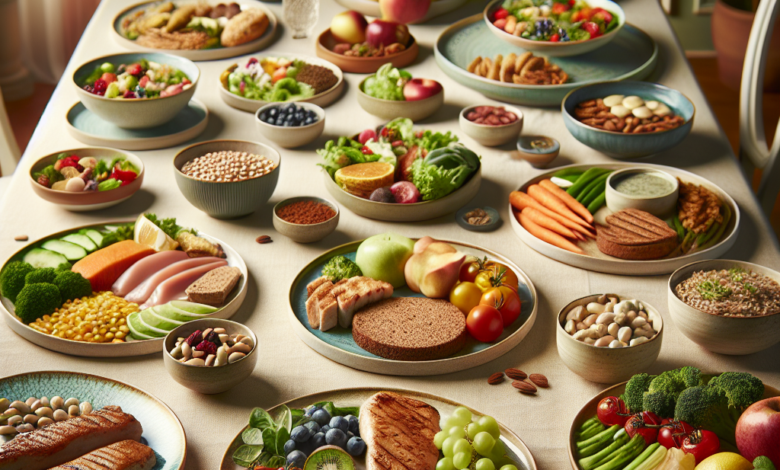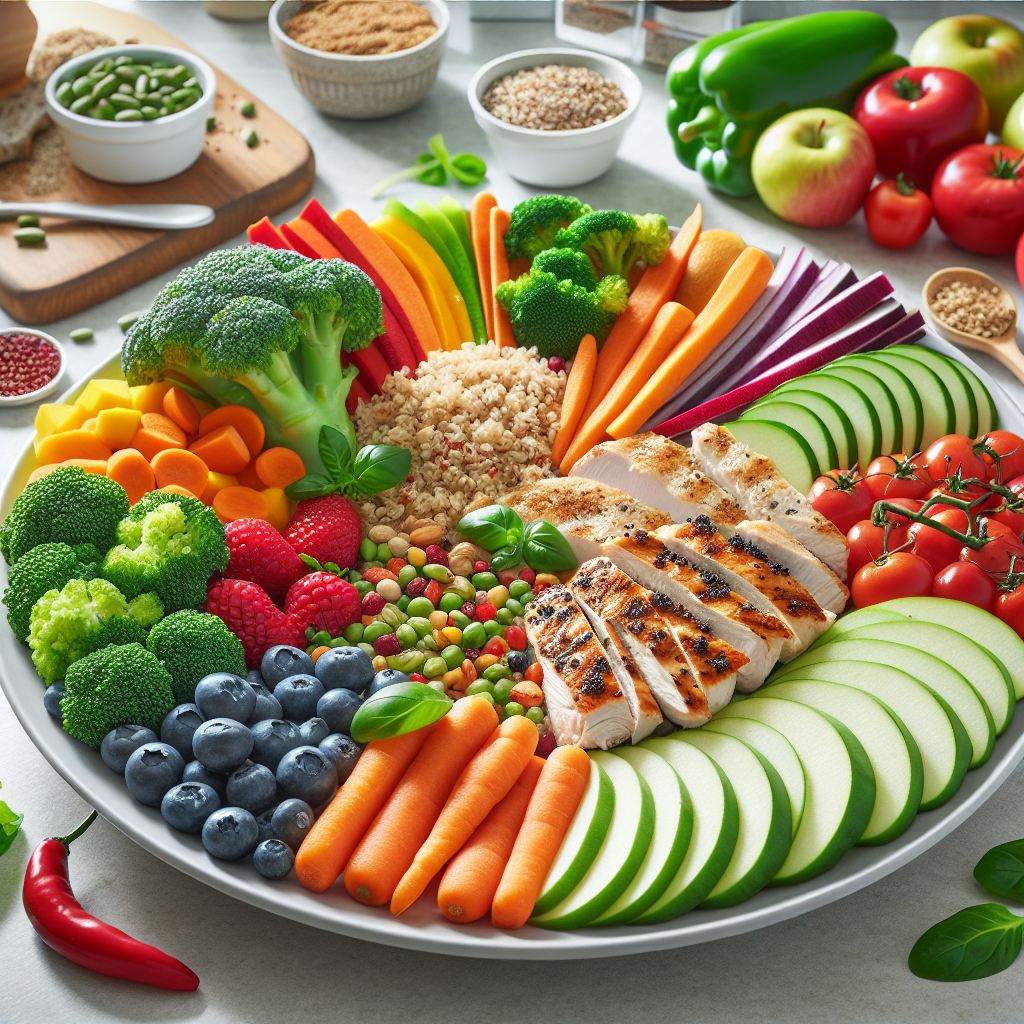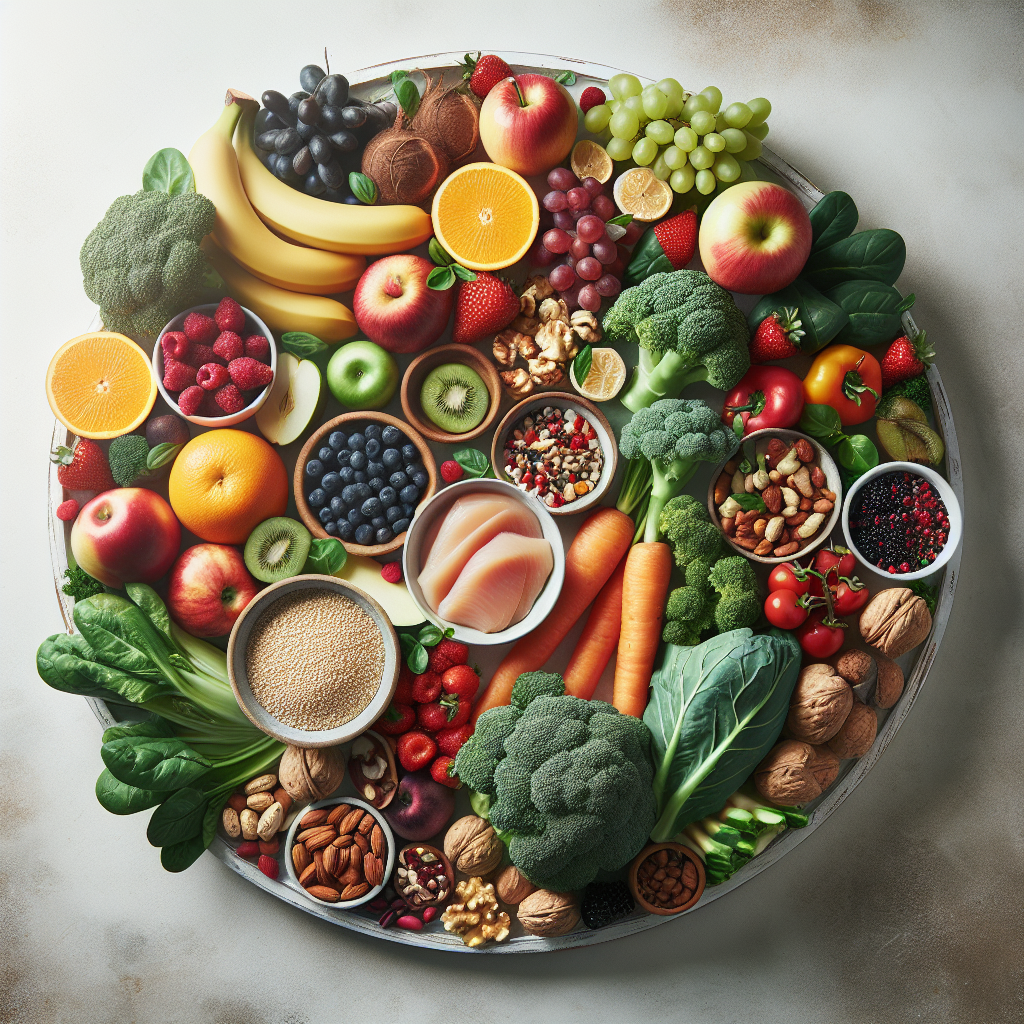Healthy Eating Plans: Your Guide to a Balanced Diet!

Embarking on the journey to a healthier lifestyle begins with understanding the fundamentals of healthy eating plans. In a world where convenience often trumps nutrition, it’s crucial to prioritize a balanced diet that caters to your body’s needs. A well-structured eating plan can provide the necessary nutrients, bolster your energy levels, and enhance overall well-being.
Healthy eating isn’t about strict dietary limitations or depriving yourself of the foods you love. Instead, it’s about feeling great, having more energy, improving your health, and stabilizing your mood. By incorporating a variety of foods from all the major food groups, you can ensure a balanced intake of essential vitamins, minerals, and other nutrients.
But where do you start? The first step is to educate yourself about the different food groups and their benefits. From lean proteins and whole grains to fresh fruits and vegetables, each group plays a vital role in maintaining health. Understanding portion sizes and the importance of hydration also forms the backbone of any effective eating plan. It’s not just about what you eat, but how much and how often.
Moreover, integrating mindful eating habits can drastically improve the effectiveness of your healthy eating plan. Paying attention to hunger cues, eating slowly, and savoring each bite can prevent overeating and foster a healthier relationship with food.
Ready to dive deeper into the world of balanced diets and nutritious meals? Explore More at Muscle Theory and start your journey to a healthier you today!
Benefits of a Balanced Diet

A balanced diet is more than just a way to maintain a healthy weight; it is a cornerstone of overall well-being. When you consume the right mix of nutrients, your body functions optimally, and you can enjoy numerous health benefits. Here’s a closer look at some of the key advantages of adhering to a balanced diet:
- Enhanced Energy Levels: A diet rich in complex carbohydrates, lean proteins, and healthy fats provides a steady supply of energy, preventing the dips and spikes associated with poor eating habits.
- Improved Mental Health: Nutrient-dense foods such as fruits, vegetables, fish, and whole grains have been linked to better mental health. They can help reduce symptoms of depression, anxiety, and other mental health disorders.
- Better Immune Function: Consuming a variety of vitamins and minerals strengthens your immune system, making you less susceptible to illnesses and infections. Vitamin C, zinc, and antioxidants are particularly beneficial.
- Stronger Bones and Teeth: A diet high in calcium and vitamin D supports bone density and dental health, helping to prevent conditions like osteoporosis and tooth decay.
- Optimal Weight Management: By focusing on nutrient-rich foods and proper portion sizes, you can maintain a healthy weight and reduce the risk of obesity-related diseases such as diabetes and heart disease.
- Reduced Risk of Chronic Diseases: Diets rich in fruits, vegetables, lean proteins, and whole grains are associated with a lower risk of chronic diseases such as heart disease, stroke, and certain cancers.
Adopting a balanced diet doesn’t just impact your physical health; it also promotes emotional and mental well-being. Making mindful food choices can lead to a healthier, happier life, ensuring you thrive both inside and out.
Key Nutrients for a Healthy Diet
Understanding the key nutrients essential for a healthy diet is fundamental to achieving optimal health. These nutrients perform a myriad of functions in the body, from energy production to supporting immune function. Here’s a breakdown of the critical nutrients you should include in your daily diet:
- Proteins: Often referred to as the building blocks of the body, proteins are essential for muscle repair, cell growth, and hormone production. Sources include lean meats, fish, eggs, and plant-based options like beans and lentils.
- Carbohydrates: The body’s primary energy source, carbohydrates should come from complex sources such as whole grains, vegetables, and fruits. These provide sustained energy and are rich in fiber, aiding in digestion.
- Fats: Healthy fats are vital for brain health, energy, and the absorption of fat-soluble vitamins (A, D, E, and K). Include sources like avocados, nuts, seeds, and olive oil in your diet.
- Vitamins: These organic compounds are crucial for various bodily functions. For instance, vitamin C boosts the immune system, while B vitamins are essential for energy production. A diet rich in fruits, vegetables, and whole grains ensures you get a broad spectrum of vitamins.
- Minerals: Essential minerals like calcium, potassium, and iron play significant roles in bone health, muscle function, and oxygen transport. Dairy products, leafy greens, and lean meats are excellent sources.
- Water: Often overlooked, water is crucial for nearly every bodily function, including temperature regulation, digestion, and waste elimination. Aim to drink at least eight glasses of water a day, more if you’re active.
By incorporating a variety of these key nutrients into your daily meals, you can ensure that your body receives the necessary components to function efficiently and stay healthy. Balance and variety are the cornerstones of a nutritious diet, helping you to achieve both your fitness and health goals.
Creating Your Own Healthy Meal Plan

Creating your own healthy meal plan can seem daunting, but with a few simple steps, you can design a plan that meets your nutritional needs and fits your lifestyle. Here’s how to get started:
- Assess Your Nutritional Needs: Begin by understanding your dietary requirements. Consider factors such as age, gender, activity level, and any specific health goals. Online calculators and consultations with a dietitian can help you determine your caloric and macronutrient needs.
- Plan Your Meals: Start by mapping out a week’s worth of meals. Aim to include a balance of proteins, carbohydrates, and healthy fats in each meal. Variety is key; try to incorporate different fruits, vegetables, and protein sources to keep things interesting and nutritionally diverse.
- Prep Ingredient Lists: Once your meals are planned, create a detailed grocery list. This helps ensure you have all the ingredients on hand and can prevent last-minute unhealthy food choices. Stick to the list and avoid shopping when hungry to resist impulse buys.
- Prep Ahead: Consider meal prepping to save time and ensure you stick to your plan. Cook larger batches of grains, proteins, and veggies, and store them in portioned containers. This makes it easier to assemble meals quickly throughout the week.
- Stay Flexible: It’s important to be flexible with your meal plan. Life happens, and you might need to adjust your meals occasionally. Have a few backup options like frozen veggies, canned beans, or pre-cooked grains for those unexpected moments.
- Monitor and Adjust: Keep track of your meals and how they make you feel. If certain foods don’t sit well, or you’re not hitting your nutritional goals, adjust your plan accordingly. Regularly revisiting and tweaking your meal plan can help you stay on track.
By taking control of your diet and planning your meals, you can ensure that you’re fueling your body with the nutrients it needs. A well-thought-out meal plan can make healthy eating easier, more enjoyable, and sustainable in the long run.
Tips for Maintaining a Balanced Diet

Maintaining a balanced diet is crucial for overall health and well-being. Here are some essential tips to help you stay on track with your healthy eating plans:
- Eat a Variety of Foods: Ensure you’re consuming a range of different foods to get all the nutrients your body needs. Incorporate fruits, vegetables, whole grains, lean proteins, and healthy fats into your diet. Variety not only keeps meals interesting but also helps you receive a broad spectrum of vitamins and minerals.
- Watch Your Portion Sizes: Even healthy foods can contribute to weight gain if eaten in large quantities. Be mindful of portion sizes and listen to your body’s hunger and fullness cues. Using smaller plates and bowls can help control portions and prevent overeating.
- Stay Hydrated: Water is vital for every bodily function, including digestion and nutrient absorption. Aim to drink at least 8 glasses of water a day. You can also include hydrating foods such as cucumbers, tomatoes, and watermelon in your diet.
- Limit Added Sugars and Processed Foods: These can contribute to weight gain and various health issues. Opt for natural sources of sweetness like fruits, and choose whole, unprocessed foods whenever possible. Reading food labels can help you avoid hidden sugars and unhealthy additives.
- Practice Mindful Eating: Slow down and savor your meals. Paying attention to what you eat can improve digestion and help you recognize when you’re full. Avoid distractions like TV or smartphones during meals to focus on the flavors and textures of your food.
- Plan Ahead: Planning your meals and snacks ahead of time can prevent unhealthy last-minute choices. Keep healthy snacks on hand, such as nuts, yogurt, or fresh fruit, to avoid reaching for junk food when hunger strikes.
- Include Physical Activity: A balanced diet goes hand in hand with regular physical activity. Exercise helps regulate appetite, improve metabolism, and boost overall health. Aim for at least 30 minutes of moderate exercise most days of the week.
By incorporating these tips into your daily routine, you can maintain a balanced diet that supports your health goals and enhances your quality of life. Remember, balance is about consistency, not perfection. Make small, sustainable changes and enjoy the journey to a healthier you.
Common Mistakes to Avoid in Diet Plans

Embarking on a diet plan can be a transformative journey, but it’s essential to avoid common pitfalls that can derail your progress. Here are some mistakes to watch out for:
- Skipping Meals: Some people believe that skipping meals, especially breakfast, will help them lose weight faster. However, this can lead to overeating later in the day and a slower metabolism. Aim to eat regular, balanced meals to keep your energy levels stable and avoid unnecessary snacking.
- Falling for Fad Diets: Fad diets promise quick results but are often unsustainable and can be harmful in the long run. They usually lack essential nutrients and can lead to yo-yo dieting. Instead, focus on developing a balanced, long-term eating plan that fits your lifestyle.
- Neglecting Nutrient Balance: Diets that overly restrict certain food groups can deprive your body of vital nutrients. Ensure your diet includes a mix of proteins, carbohydrates, and fats to support overall health. For instance, cutting out all carbs can lead to energy deprivation and nutrient deficiencies.
- Underestimating Liquid Calories: Beverages like sodas, sugary coffee drinks, and alcohol can add a significant amount of calories to your diet without making you feel full. Opt for water, herbal teas, or black coffee to stay hydrated without the extra calories.
- Ignoring Portion Control: Even healthy foods can contribute to weight gain if consumed in large amounts. Be mindful of portion sizes and try to eat slowly to give your body time to signal when it’s full. Using smaller plates can also help manage portion sizes more effectively.
- Not Getting Enough Sleep: Sleep is a crucial component of a healthy lifestyle. Lack of sleep can disrupt hunger hormones and lead to increased appetite and cravings for unhealthy foods. Aim for 7-9 hours of quality sleep each night to support your diet and overall well-being.
- Setting Unrealistic Goals: Setting overly ambitious goals can lead to frustration and disappointment. Establish realistic, achievable milestones and celebrate your progress along the way. Remember, sustainable weight loss and health improvements take time.
By being aware of these common mistakes, you can navigate your diet plan more effectively and achieve lasting results. Stay committed, be patient, and remember that a balanced diet is a lifelong journey, not a quick fix.
Explore More at Muscle Theory



